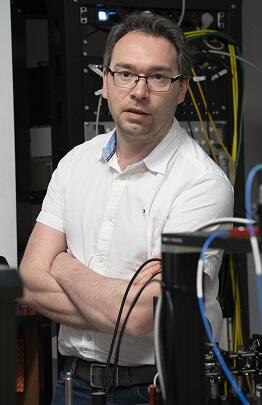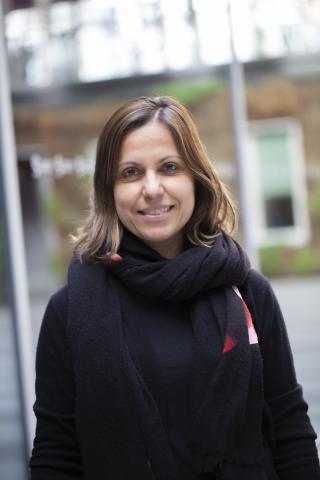
Julien Laurat
Light tamer and quantum memory specialist
We're at a key stage in the scale-up of quantum technology, but one that can only be achieved by working hard in start-ups.
An optical engineer by training, Julien Laurat turned to the fields of quantum computing and quantum information. It's quite natural that he should now be part of the Laboratoire Kastler Brossel (LKB), the French flagship of quantum physics, part of whose premises are at Sorbonne University, where he is a professor, as well as having co-founded the start-up Welinq, specialized in quantum memories.
From the infinitely large to the infinitely small. Initially fascinated by astronomy and astrophysics, Julien Laurat became interested in particles and quantum physics. Trained as an engineer, he pursued exploratory research, he explains from the Laboratoire Kastler Brossel on Sorbonne University's Pierre et Marie Curie campus.
In the early days of quantum computing
It's in a room teeming with dozens of lasers of different sizes and colors that this 45-year-old native of Brittany has carried out most of his research, which began almost twenty years ago. After graduating in engineering from the Institut d'Optique, Julien Laurat embarked from 2001 to 2004 on a thesis at Sorbonne University on quantum entanglement, a phenomenon in which two photons share common properties that can be used for teleportation protocols. "We were in the 2000s, at the beginning of the field of quantum information," he recalls.
In 2005, the young researcher flew to Los Angeles to work at the prestigious California Institute of Technology (Caltech). During his stay, which lasted over two years, he took part in the first demonstrations of quantum memory based on laser-cooled atoms, which were to form the basis of some of his future work. After obtaining an associate professor position at Sorbonne University, he set up a team with the aim of efficiently transporting quantum information.
This field of research, still unknown twenty years ago, is on the verge of revolutionizing computing and communication capacities. "It requires the development of a number of new techniques that didn't exist before, in particular quantum memories that can stop light," explains Julien Laurat. But until 2015, the probability of retrieving information after storing it was between 20% and 30% maximum. For even a quantum computer, this posed a problem. "We've realized that we need a lot more atoms than we thought," continues the researcher.
From laboratory to start-up
Julien Laurat and his team restarted from scratch. In 2015, the 70% efficiency mark was reached. "But we were aiming for 90%", explains the scientist. After (re)studying the calculations, the team realized that the lasers used to interact with the atoms, were not at the optimum frequency or color. "So we changed them all. And in 2020, we succeeded in achieving 90% quantum memory efficiency. We've even demonstrated that we can entangle, create correlations between two quantum memories," said the researcher.
For Julien Laurat, these results are the happy culmination of almost two decades of research. "I never thought we'd reach this level of efficiency. A few years ago, I wondered whether I should stop this kind of development. But I'm a bit stubborn..." he recalls. In January 2022, he founded the start-up Welinq with three other collaborators, including Tom Darras, a former doctoral student, and Eleni Diamanti, a researcher at Sorbonne University.
"We're at the beginning of the marathon”
Hosted by Sorbonne University, a major asset for Welinq, the young company aims to accelerate the development of quantum memories, making them both transportable and industrial. Last January, it raised five million euros, with the aim of expanding and hiring up to fifteen employees by next year. Julien Laurat explains: "We have a very significant leverage effect via the start-up, to be able to deploy this technology and explore a large number of fields of application.
Between laboratory very exploratory experiments and the development of industrial prototypes, the dual role of researcher and entrepreneur suits Laurat perfectly. A member of the Institut Universitaire de France, he recently received a 2.5 million euro grant from the European Research Council (ERC) to develop new quantum devices combining atoms and nanophotonics over the next five years. He is also a member of the Quantum Internet Alliance (QIA), which aims to develop a Europe-wide quantum Internet over the next ten years. We're at the beginning of the quantum technology marathon," admits Julien Laurat. We're at a key stage in the scaling-up of this technology, but that can only be achieved through major work in start-ups."
Eleni Diamanti
Spécialiste en cryptographie quantique
Le plan quantique va permettre de montrer l'engagement de la France dans ce domaine.

